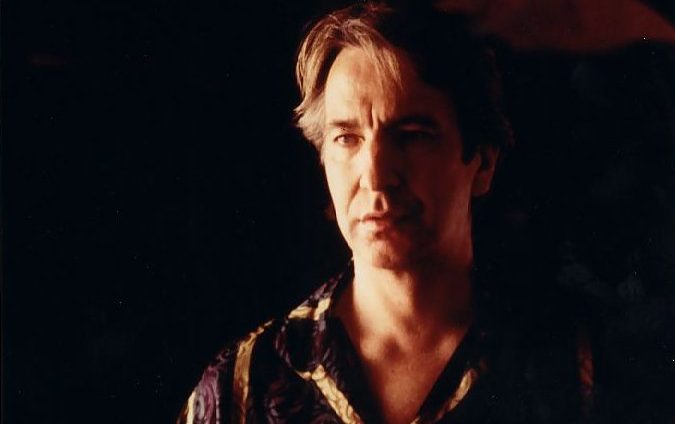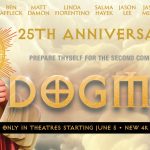An Actor Short on Words, Long on Presence
By Linda Joffee – Christian Science Monitor
We order two Perriers. Moments later, the waiter returns and, with silent efficiency, places one glass in front of me, another in front of British actor Alan Rickman, then another in front of the empty seat. The waiter, with equal efficiency, abruptly turns on his heels and is gone. Mr. Rickman languidly moves his head to fix his gaze on the third glass. Just as languidly, and with the merest hint of a smile, he returns his gaze, remarking dryly, “A mysterious custom they have here.”
The story may lose something in the retelling. But anyone who has seen Rickman on stage or screen will know already that he is one of the few actors who can consummately milk such a bizarre mistake for all the drollery it’s worth.
I am talking with Rickman (over three glasses of Perrier water) in the lounge at Berlin’s Savoy Hotel. He is here working on his latest film, “Mesmer”, the life story of Franz Mesmer, the 18th- century Austrian physician from whom the term “mesmerism” derives. With the screen play by internationally acclaimed British writer Dennis Potter (“Pennies From Heaven,” “The Singing Detective”) and Rickman(“Die Hard,””Robin Hood: Prince of Thieves,” “Truly, Madly, Deeply”) in the title role, the project promises to be worth watching.
Indeed, Rickman, generally is worth keeping an eye on. Critics of stage and screen on both sides of the Atlantic have marked him as a talent to be reckoned with. It was Welsh-born Rickman who, a few years back dazzled London, and later New York theatergoers as the suave, sardonic 17th-century seducer, Valmont, in Christopher Hampton’s “Les Liaisons Dangereuses.” On the strength of that performance, the British actor was asked to play alongside Bruce Willis in what subsequently became a major international box office hit, “Die Hard.” Rickman, as is generally agreed, stole the film from its more famous star. It was his first motion picture.
“It was just a matter of being at the right place at the right time,” says Rickman, with a deft feint at any attempt to hype him. “You have to be realistic: I think I was hired because I was cheap.”
On the back of that came “”Robin Hood: Prince of Thieves,” in which Rickman, yet again was widely accused by the critics of grand larceny: As the wicked Sheriff of Nottingham, the former Royal Shakespeare Company thespian telegraphed strength of thought and feeling that frankly eluded the film’s decidedly more highly paid big name, Kevin Costner. Is Rickman aware of this? “Not really,” he replies, again with the barest suggestion of a smile, “because I was playing it, you were watching it.”
Similar to his acting style, Rickman is, in conversation, of the minimalist school of chat. He has a tendency to pause a beat or two longer than normal before speaking, or before a word or phrase that he wants to emphasize. What he does say is cautiously formed and meticulously enunciated. There are no subclause elaborations, no adjectival adornments, But, according to friends and colleagues, Rickman doesn’t need to say much: He has the knack of making an impact by just entering a room.
“Alan has a very strong presence,” observes Amanda Ooms, his Dutch costar in “Mesmer.” “In fact, it’s the quality that stands out most about him. If I were to describe him, the first word that comes to mind is ‘huge,’ both physically and in terms of his aura.”
Since “Die Hard,” Rickman has made seven films, the most critically acclaimed of his performances being – the Sheriff of Nottingham – notwithstanding – the sensitive cello-playing Jamie, who comes back from the grave to comfort his grieving girlfriend in “Truly Madly, Deeply.”
He has also managed to squeeze in London stage stints in the modern Japanese play “Tango at the End of Winter,” and the title role in “Hamlet.” He has portrayed a variety of characters, yet, when people think of Rickman, it is invariably as a forbidding, slightly lip-curled creep.
“Why is that, do you suppose?” asks Rickman, with seeming genuine concern to uncover what is, for him, a perplexing phenomenon.
When told that he brings something a bit more subtle to the stereotype rendering of a baddie, he – I didn’t realize it was a trick question – retorts gently but firmly, “No, I’ll tell you why. It’s because there were two movies, which got a lot of publicity and made a lot of money for the producers and cost a lot of money to make and starred some very famous American movie stars. It is as simple as that.”
It’s the typecasting in people’s minds, rather than the films themselves, that Rickman gets a bit impatient with. Unlike a lot of British actors who achieve a certain degree of fame in highly popular yet artistically lightweight Hollywood movies, then return to Britain and promptly bite the hand that has fed them in order to retain credibility among their more serious British acting colleagues, Rickman expresses nothing but gratitude.
“The whole experience was very enjoyable,” says Rickman, “because it opened doors…. I wouldn’t be in Berlin making this movie if it were not for those films. So I have every reason to be grateful to them.”
He recalls the night in Los Angeles when he first saw “Die Hard” at a local cinema. He walked into the movie house an anonymous, ordinary Joe. He walked out a star. “It felt like London during the rush hour,” he recalls with a chuckle, describing how the filmgoers mobbed him.
With Robin Hood: Prince of Thieves,” Rickman is particularly pleased that it appeals to children. Yet, when the timely subject of family values in movies is raised, the actor bucks the current trend toward speaking out against graphic portrayals of sex and violence.
“I’m not a fan of censorship,” Rickman states emphatically. “I would hate to think that some sort of morality control is going to start exercising itself; I believe that’s a kind of prison to the filmmaker. I understand what [those critics] are saying, but I feel it’s a dangerous thing. For starters, who is going to be the arbiter of taste?”
That said, Rickman indicates that he is deeply concerned about the “spiritual wasteland” he sees all around him. He says he has a strong desire, though his acting both on stage and screen, to do something to help change things.
Such concern added fuel to the idealism behind a recent bid of a group of leading British actors, directors, and playwrights, led by Rickman, to gain control of the Riverside Studios, a respected London fringe theater that was for sale.
It was a bold, creative move to help revitalize an increasingly musical-oriented, commercially “safe’ London stage. The group’s bid failed. Pounds and pence ruled the day. A more business- minded theater manager took over the theater.
“The group [of actors and directors] was an extraordinary gathering of talent,” Rickman says. “that we failed is I think, just another sign of what we are talking about in terms of a spiritual wasteland.”
He is greatly disturbed by the growing emphasis on commercialism and the dramatic reining in of government support for the arts in Britain. Still, he refuses to lose hope that he and his theater colleagues will ultimately find an opportunity for playing a part, however modest, in stemming what they see as the swelling philistine tide. “Certainly something will come out of our efforts at Riverside Studios,” says Rickman.
“I don’t know what or where or when. But the discussion is not closed.”



